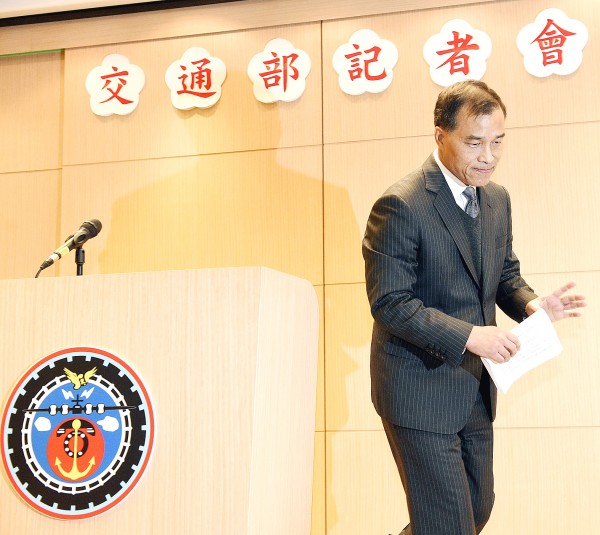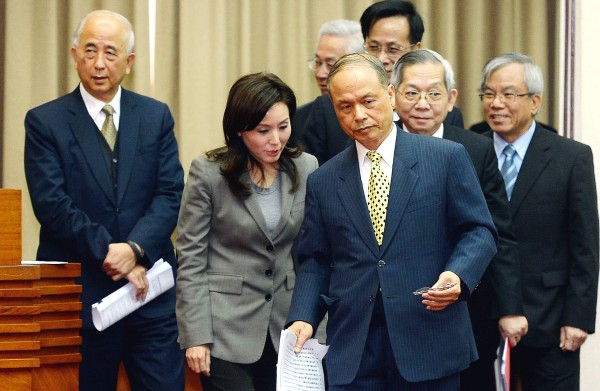《TAIPEI TIMES 焦點》 Transport minister quits over THSRC

Minister of Transportation and Communications Yeh Kuang-shih announces his resignation at a news conference in Taipei yesterday after the Legislative Yuan set aside his rescue plan for Taiwan High Speed Rail Corp. Photo: Chen Chih-chu, Taipei Times
OFF THE RAILS: Yeh Kuang-shih resigned after his plan to save the high-speed rail operator from bankruptcy was derailed by the Transportation Committee
Minister of Transportation and Communications Yeh Kuang-shih (葉匡時) resigned yesterday after Taiwan High Speed Rail Corp’s (THSRC, 台灣高鐵) financial restructuring plan failed to secure the bipartisan support it needed to be approved by the legislature’s Transportation Committee.
THSRC chairman Tony Fan (范志強) also tendered his resignation following the setback at the legislature.
In response to Yeh’s announcement, Presidential Office spokesperson Ma Wei-kuo (馬瑋國) said that President Ma Ying-jeou (馬英九) supports Premier Mao Chi-kuo’s (毛治國) bid to keep Yeh as transport minister.
According to the ministry, if the plan wins legislative approval, THSRC will have 59 more years to continue operating the current build-operate-transfer model.
Under a ministry financial model, the rail operator during that time would register a total revenue of NT$3.1582 trillion (US$98.7 million), from which NT$196.4 billion could be paid to shareholders as dividends — after deducting NT$1.43 trillion in operating costs, NT$550.1 billion in facilities and equipment costs, NT$316.9 billion in bank loans and NT$485.4 billion in interest payments.
The Bureau of High Speed Rail said last week that yesterday was the government’s last chance to salvage the debt-ridden company from bankruptcy, which if not prevented, could take place in March or April.
However, Chinese Nationalist Party (KMT) and Democratic Progressive Party lawmakers on the committee unanimously elected to hold off on reviewing the plan, saying they are convinced that extending the high-speed rail operator’s concession period by 40 years would only benefit investors, not the public.
Shih Jun-ji (施俊吉), who served as chairman of Financial Supervisory Commission during the DPP’s eight years in power, argued that the ministry’s proposal was designed to benefit “certain individuals” and the rail company’s future stock holders would be able to reap an annual return on investment of 5.9 percent for 58 years.
Some lawmakers also said that the government should let the company go bankrupt and then take it over later, while others said that the ministry had grossly exaggerated the numbers and still others said that dealing with the plan is neither an urgent, nor a fair task.
Yeh said he has made addressing the high-speed rail’s financial predicament one of his top priorities since he took office in 2013, adding that he has been working closely with THSRC and the Bureau of High Speed Rail since then to avoid the operator’s imminent bankruptcy.
He also said that he had personally briefed the committee six times over the high-speed rail operator’s financial status, and that ministry officials and THSRC management had also privately explained the severity of the issue to lawmakers on many occasions.
“However, the committee still failed to approve the financial restructuring plan — this will lead to the bankruptcy of THSRC. Therefore, the Ministry of Transportation and Communications must prepare to take over and buy back the high-speed rail system. Under these circumstances, all parties involved would become losers,” Yeh said.
Yeh stressed that the plan was sought to dilute the THSRC shares held by five original investors by first reducing capital, before transforming the operator into a company dominated by state-run or state-invested institutions, as well as the public, by raising capital later.
He added that the plan was meant to allow everyone in the nation to oversee the company and benefit from its operations.
“Unfortunately, many people have misunderstood the plan. Some media outlets and even experts have deliberately obscured the spirit of this plan and said that it was designed to benefit certain private corporations. Personally, I find such accusations unacceptable. Yet based on my belief that government officials should be held responsible for the policies they promote, I thereby hand in my resignation,” he said, apologizing to the public and to coworkers who supported him for failing to meet their expectations.
Yeh left the news conference immediately after his announcement, without commenting on what the government would do to save the high-speed rail system.
At the Legislative Yuan, Yeh said that the ministry would not make any further efforts to push for the financial restructuring plan to pass at the legislature and will prepare to take over the operation of the high-speed rail system.
“Maybe I was incompetent in my handling of this matter,” Yeh said.
“We were hoping that the legislature would approve the financial restructuring plan, because I believe it is the better option for solving THSRC’s financial problems — the government takeover is a solution that produces no winner,” Yeh said.
“Since lawmakers failed to reach a consensus on this issue, we will just have to start preparing for that option [government takeover],” Yeh added.
Yeh said that the ministry will ensure that the high-speed rail system continues to operate.
Asked how he felt about the result being handed down on his birthday, he said that it just so happened that his birthday had coincided with the most important day in the history of Taiwanese transport.
“I believe I will include this process when I write my memoir,” he said.
The ministry also issued a statement urging the company’s main shareholders to take responsibility for solving the problem.
“The company’s main shareholders should make the interests of high-speed rail passengers their top priority and strive to keep the system running before the company and the government complete the remaining procedures based on the contract terms,” the ministry said.
The ministry also denied that the high-speed rail system would generate a profit of NT$800 billion (US$25 billion) if THSRC were given 40 years to operate, saying that the figure represents total revenue income prior to the deduction of costs and taxes.
“Based on our analysis, the company is only set to generate earnings per share of approximately NT$0.66 per year on average, which is a reasonable return on investment over a 59-year period,” the ministry added.(Additional reporting by CNA)
新聞來源:TAIPEI TIMES

Minister of Finance Chang Sheng-ford, front, and chairpersons of state-invested banks yesterday attend a meeting of the Legislative Yuan’s Finance Committee, where they fielded lawmakers’ questions about investing in the Taiwan High Speed Rail Corp. Photo: Lin Cheng-kun, Taipei Times

















